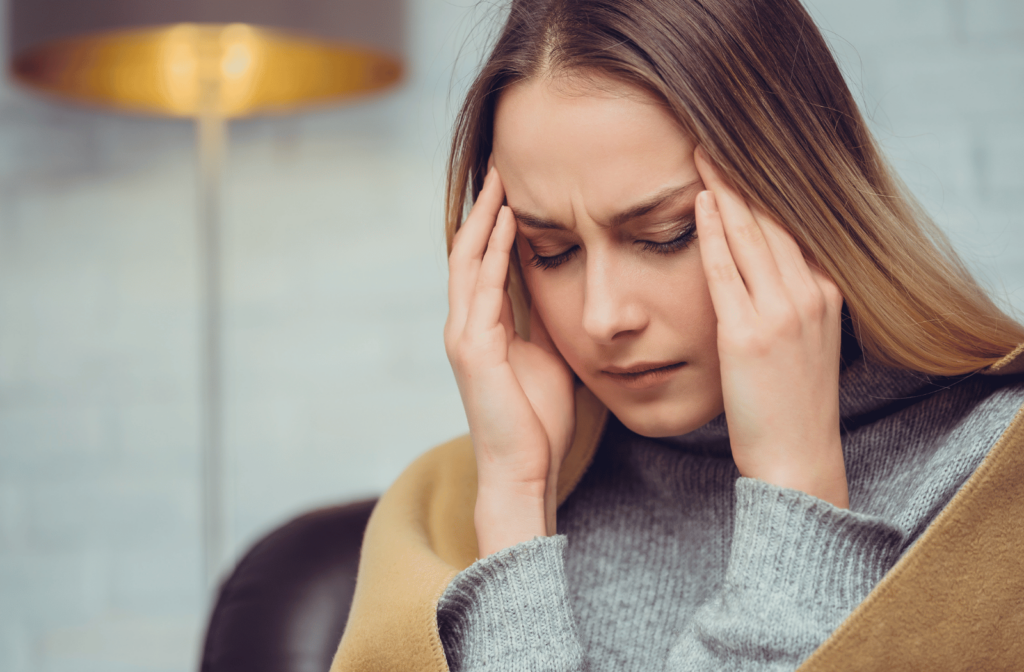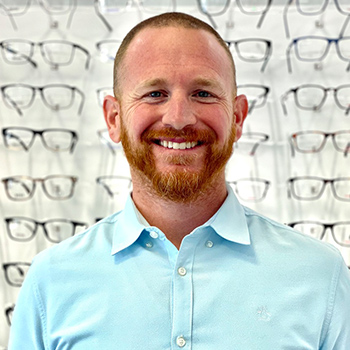Dry eye is a common condition that occurs when the eyes do not produce enough tears or when the tears evaporate too quickly. This can lead to discomfort, redness, and a feeling of dryness or grittiness in the eyes.
While dry eye is generally not a serious condition, it can cause various symptoms and complications and, in persistent cases, should be managed with your optometrist. But can dry eye cause headaches?
Unfortunately, the answer isn’t simple, as there’s a complex relationship between the eyes and the head, with some evidence potentially linking the two conditions.
What is Dry Eye?
Tears are necessary for maintaining the health and comfort of the eyes, as they help to keep the surface of the eye moist and lubricated. Usually, your tears spread across your eye and form a tear film whenever you blink. However, if this tear film cannot form, your eyes can become dry and uncomfortable.
Several different factors can contribute to dry eye, including:
- Aging: As we age, our eyes naturally produce fewer tears. While both men and women can develop dry eye, it is more common in women who have gone through menopause.
- Medical conditions: Certain medical conditions can be linked to dry eye. This includes rheumatoid arthritis, Sjogren’s syndrome, thyroid problems, and lupus.
- Medications: Some medications, such as antihistamines, diuretics, and antidepressants, can cause dry eye as a side effect.
- Environmental factors: Dry, windy, or dusty environments can cause your tears to evaporate more quickly, leading to dry eyes.
- Lifestyle factors: People who spend a lot of time in front of a computer or looking at screens may be more prone to dry eye as they tend to blink less frequently.
Some people may also experience dry eye as a side effect after laser eye surgery.
While most people occasionally experience dry eyes, persistent dry eyes may be linked to a blockage of your tear ducts or meibomian glands. Meibomian gland dysfunction (MGD) is the cause of nearly 80% of all cases of dry eyes.
Symptoms of Dry Eye
The most common symptoms of dry eye include:
- A feeling of dryness or grittiness
- Redness
- A burning sensation
- Discomfort or irritation
- Blurred vision
- Sensitivity to light
- Overproduction of tears as your eyes attempts to make up for the lack of moisture
Can Dry Eye Cause Headaches?
The eyes and the head are closely connected, and it is not uncommon for issues in your eyes to manifest at the same time as headaches. For example, dry eyes can lead to eye fatigue and strain, which can cause headaches. Both conditions can also occur due to inflammation, possibly creating a common trigger.
A 2019 study found that people with migraines were 20% more likely to have dry eye disease than those without. Meanwhile, a 2015 study indicated that people with migraines may have a different structure around their eyes, potentially making them more prone to dry eyes.
Despite this, there is no definite evidence that says dry eyes directly cause headaches, as not everyone with dry eyes will also experience headaches. However, if you do experience headaches and have dry eyes, it is worth considering the possibility that the two conditions may be related, as they can have similar triggers.
Exposure to hot, brightly lit environments can cause dry eyes and headaches. As well, people who spend a long time staring at computer screens may find themselves rubbing their eyes as well as their heads.
Treatment for Dry Eye and Headaches
Despite many people experiencing dry eye and headaches simultaneously, treating one may not solve the other. Unless, of course, the same trigger is causing both conditions. If you spend a lot of time in hot, dry environments or work on a computer all day, a treatment could be as simple as removing that trigger.
If you are experiencing dry eye, several treatment options may help alleviate your symptoms. These may include:
- Artificial tears: Artificial tears are eye drops that can help moisturize the eyes and relieve dryness and discomfort. They are available over the counter and in a variety of formulations, including gels, ointments, and sprays.
- Prescription eye drops: In some cases, your doctor may recommend prescription eye drops to help treat dry eye. These eye drops may contain ingredients such as cyclosporine or lifitegrast, which can help increase tear production and reduce eye inflammation.
- Intense pulsed light (IPL) treatment: A process of calibrated light pulses in which the oils blocking your glands and causing conditions such as MGD are liquefied. The FDA has certified Optilight by Lumenis as a non-invasive IPL device for this treatment.
- Lipiflow therapy: Any blockages in your eye glands are melted away through gentle heat and massage in a treatment some patients have found quite relaxing.
A simple preventative measure you can take to deal with both dry eyes and headaches is ensuring you take regular blink breaks. Since we blink less when looking at computer screens, it is important to take these moments to look away from the screen to keep our eyes hydrated and prevent eye strain.
Maintain Your Best Vision Health with Dr. Bittel Optometry
The link between our eyes and our head is complex, to be sure. While there is no direct evidence linking dry eyes to causing headaches, the two conditions are more connected than you may initially assume.
With dry eyes causing eye strain, and eye strain causing headaches, it’s worthwhile ensuring your eye health is in the best hands. For Dr. Bittel Optometry, we strive to provide the best care for our community in our state-of-the-art Dry Eye Rejuvenation Centre.
Don’t let your eyes—and your head—go without help. If you have dry eye symptoms, book an appointment today to find the relief you’re looking for.


